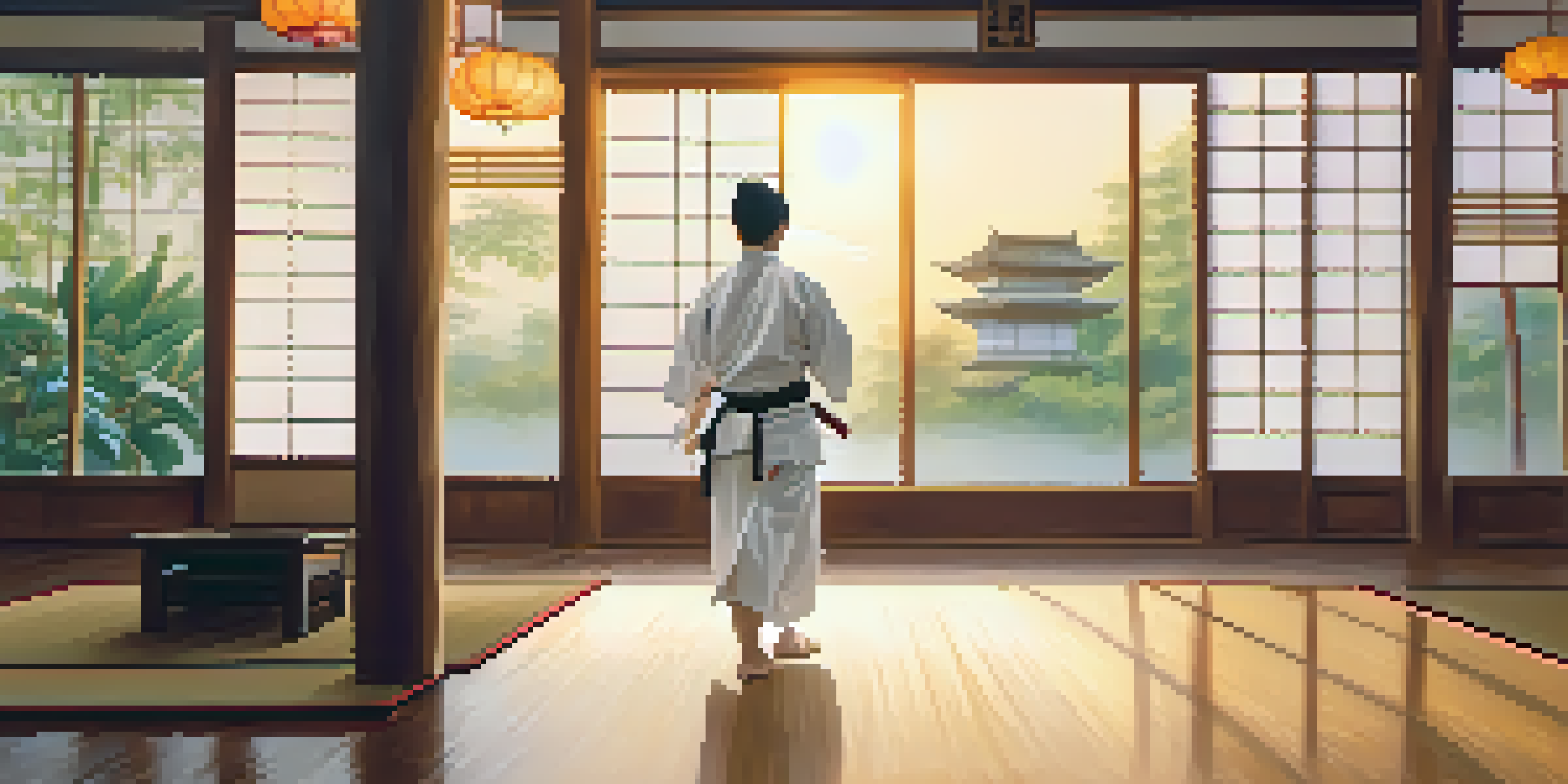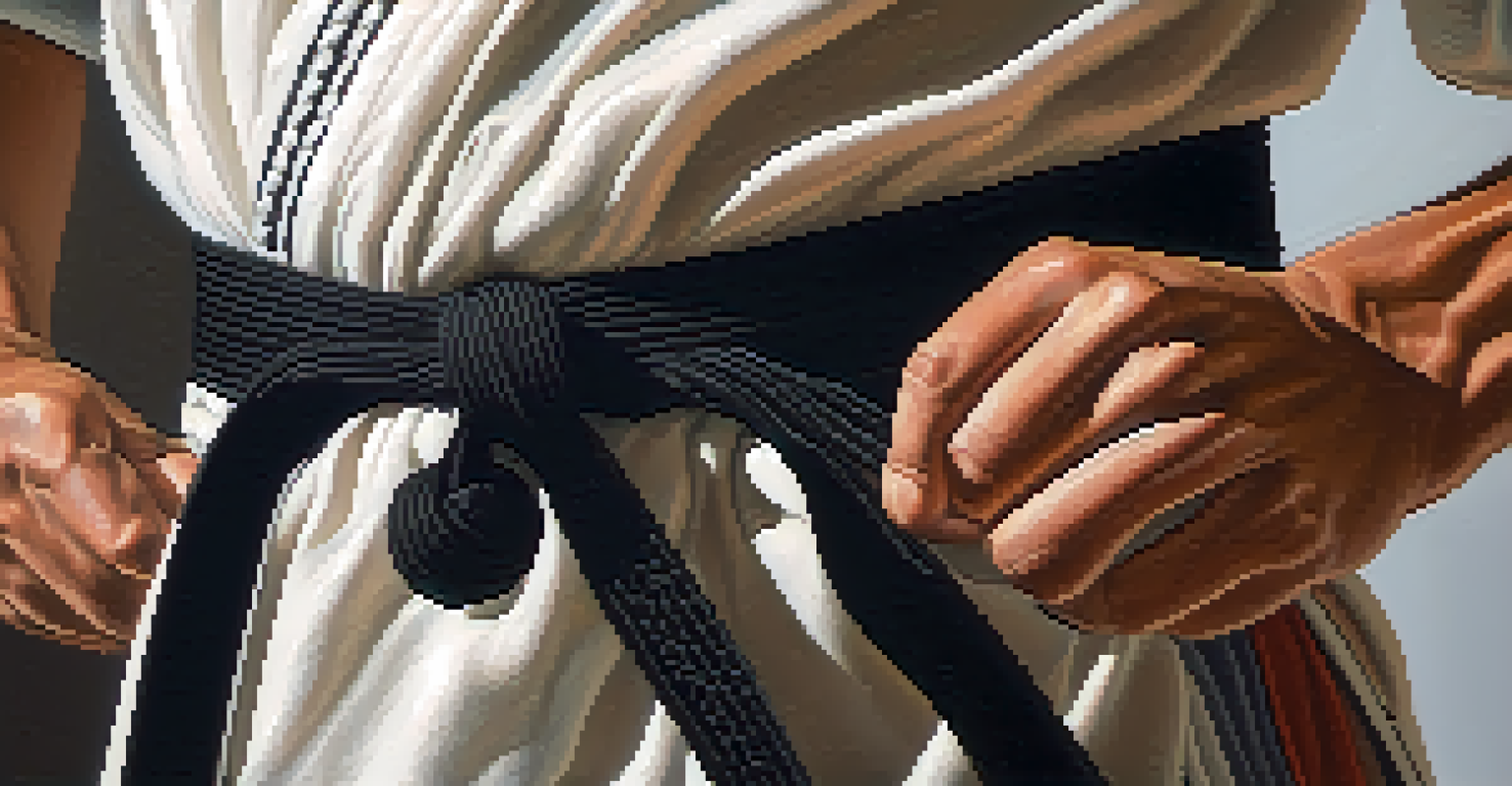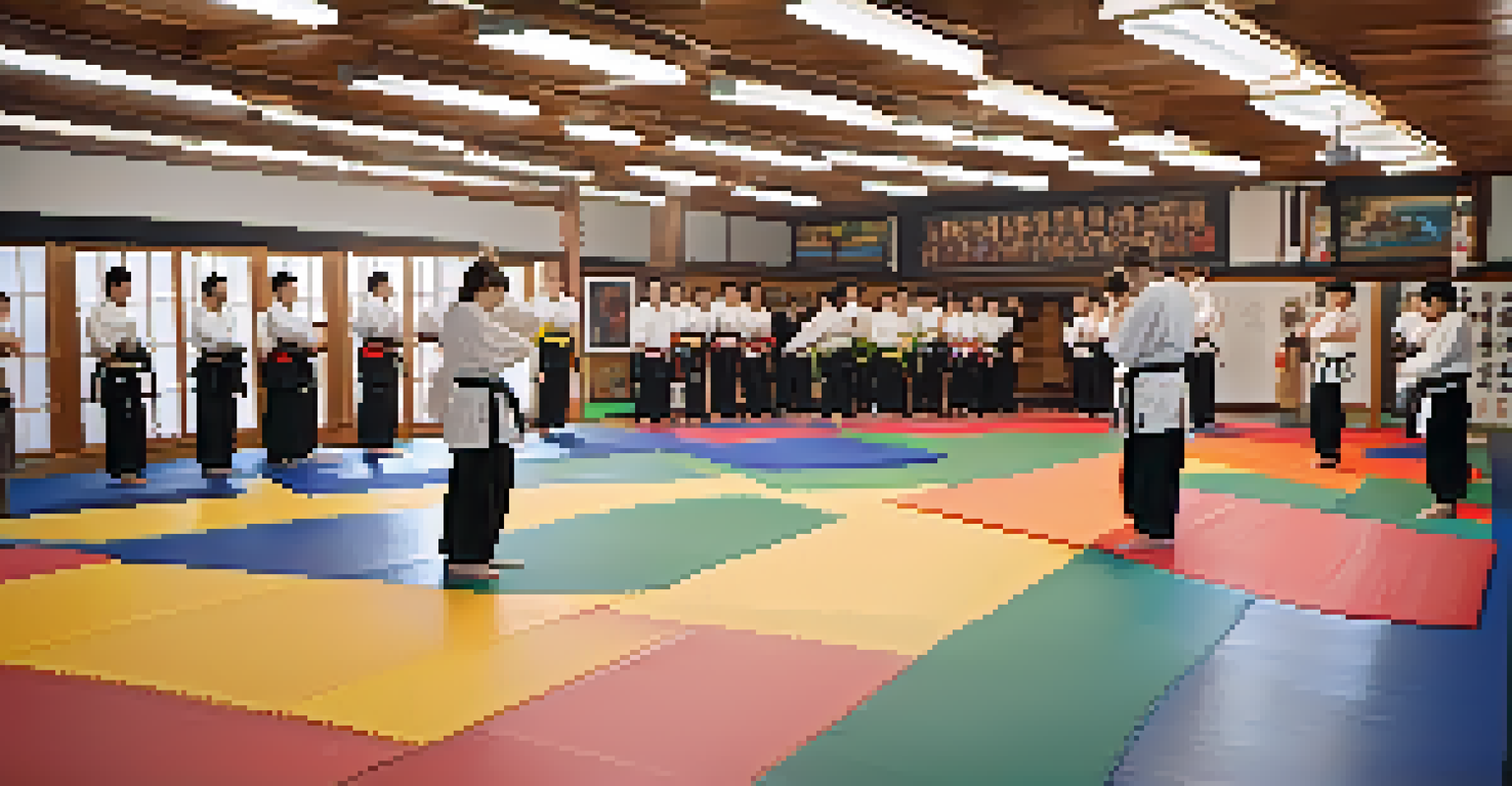Martial Arts Training: A Pathway to Greater Self-Discipline

Understanding Self-Discipline in Martial Arts
Self-discipline is at the heart of martial arts training, acting as a guiding principle. It involves setting goals, following a training regimen, and pushing through challenges, all of which are essential for progress. Think of it as building a muscle: the more you practice discipline, the stronger it becomes.
Discipline is the bridge between goals and accomplishment.
Martial arts provide a structured environment where practitioners learn to control their impulses and emotions. During training, students are often required to practice techniques repeatedly, reinforcing the importance of perseverance. This repetitive action teaches that patience and consistency lead to mastery, both in martial arts and life.
Ultimately, the self-discipline cultivated in martial arts transcends the dojo. It influences daily routines—whether it’s sticking to a workout plan, managing time effectively, or pursuing a career goal. The skills developed through martial arts become tools for navigating life’s challenges with resilience.
Setting Goals in Martial Arts Training
Goal-setting is a crucial aspect of martial arts training, providing direction and motivation. Whether it’s achieving a new belt rank, mastering a particular technique, or preparing for a competition, having clear objectives fosters a sense of purpose. This process teaches practitioners how to break larger goals into manageable steps, making the journey less overwhelming.

In many martial arts schools, students are encouraged to set both short-term and long-term goals. Short-term goals might include mastering specific moves or improving fitness levels, while long-term goals often involve earning higher ranks. This dual approach helps maintain motivation, as students can celebrate small victories along the way.
Self-Discipline Fuels Progress
Self-discipline is essential in martial arts, acting as a foundation for achieving personal and training goals.
Moreover, the practice of goal-setting in martial arts fosters a growth mindset. Practitioners learn to view challenges as opportunities for growth rather than obstacles. This mentality encourages resilience, allowing students to push through setbacks and continue striving for their goals.
The Role of Routine in Martial Arts Training
Routine is a cornerstone of martial arts training, instilling discipline through consistent practice. Students typically attend classes on a regular schedule, which helps them develop a habit of training. This routine not only reinforces the techniques learned but also establishes a sense of commitment to personal growth.
Success is not final, failure is not fatal: It is the courage to continue that counts.
By incorporating martial arts into a daily or weekly routine, practitioners create a framework for self-discipline. The act of showing up, even on tough days, builds tenacity and commitment. Over time, this commitment becomes second nature, extending beyond the dojo into other aspects of life.
Additionally, routines in martial arts often include warm-ups, drills, and sparring sessions, each serving a purpose. This structured approach ensures that students develop a comprehensive skill set while learning the importance of preparation and consistency. These lessons in routine translate seamlessly into daily life, enhancing overall discipline.
Learning from Failure in Martial Arts
Failure is an inevitable part of martial arts training, and it offers invaluable lessons in self-discipline. Whether it’s losing a sparring match or struggling to master a technique, each setback provides an opportunity for reflection and growth. Embracing failure as a learning tool fosters resilience, a vital component of self-discipline.
Through the process of grappling with failure, practitioners learn to analyze their mistakes without self-judgment. This reflective practice encourages a mindset that prioritizes improvement over perfection. As a result, students become more adept at setting realistic expectations and recognizing that progress often involves setbacks.
Goal-Setting Enhances Motivation
Setting clear short-term and long-term goals in martial arts training fosters motivation and a growth mindset.
Moreover, martial arts instills the idea that perseverance is key to overcoming obstacles. Each time a student faces a challenge, they are reminded that persistence pays off. This understanding helps cultivate a strong sense of self-discipline, empowering practitioners to tackle challenges in all areas of life.
Discipline and Respect in Martial Arts Culture
Martial arts culture emphasizes respect, which is intricately linked to self-discipline. Students learn to respect their instructors, fellow practitioners, and the art itself, fostering an environment conducive to growth. This respect is often manifested through rituals such as bowing before entering the mat, instilling a sense of humility and discipline.
As students progress in their training, they come to understand that respect is a two-way street. The discipline required to honor others enhances one’s own personal growth and self-awareness. Practitioners learn that self-discipline is not just about personal achievement but also about contributing positively to the community.
This culture of respect builds a strong foundation for self-discipline, as students are motivated to uphold the values of their martial art. The lessons learned in the dojo about respect and discipline extend beyond training, enhancing one’s interactions in everyday life. This interconnectedness reinforces the idea that self-discipline is about both personal and communal development.
Mindfulness and Focus in Martial Arts Training
Martial arts training encourages mindfulness, helping practitioners cultivate focus and self-discipline. During training, students are taught to be present in the moment, concentrating on their movements and breathing. This practice not only enhances performance but also fosters a deep awareness of one’s body and mind.
The act of focusing on techniques during martial arts classes can serve as a form of meditation. As practitioners block out distractions, they learn the value of concentrating on the task at hand. This ability to focus can be incredibly beneficial in everyday situations, whether studying for exams or managing work tasks.
Lessons from Failure Build Resilience
Embracing failure as a learning opportunity in martial arts cultivates resilience and strengthens self-discipline.
Moreover, the discipline of mindfulness in martial arts promotes self-regulation. Practitioners gain the ability to control their thoughts and emotions, which is crucial in high-stress situations. This newfound focus fosters a sense of calm and clarity, further enhancing self-discipline in various aspects of life.
The Lifelong Benefits of Martial Arts Self-Discipline
The self-discipline developed through martial arts training has lasting benefits that extend far beyond the dojo. Practitioners often find themselves more motivated to pursue personal and professional goals, shaping a proactive approach to life. The skills of commitment, focus, and resilience become ingrained habits that influence every area of their lives.
Furthermore, martial arts training fosters a sense of community and support among practitioners. The bonds formed during training encourage individuals to hold each other accountable, reinforcing their commitment to self-discipline. This supportive environment can be incredibly motivating, helping practitioners stay on track with their goals.

In essence, martial arts training is not just a physical activity; it’s a holistic journey toward self-improvement. The lessons learned about self-discipline, respect, and mindfulness create a strong foundation for personal growth. As individuals continue to train, they carry these lessons with them, enriching their lives and the lives of those around them.